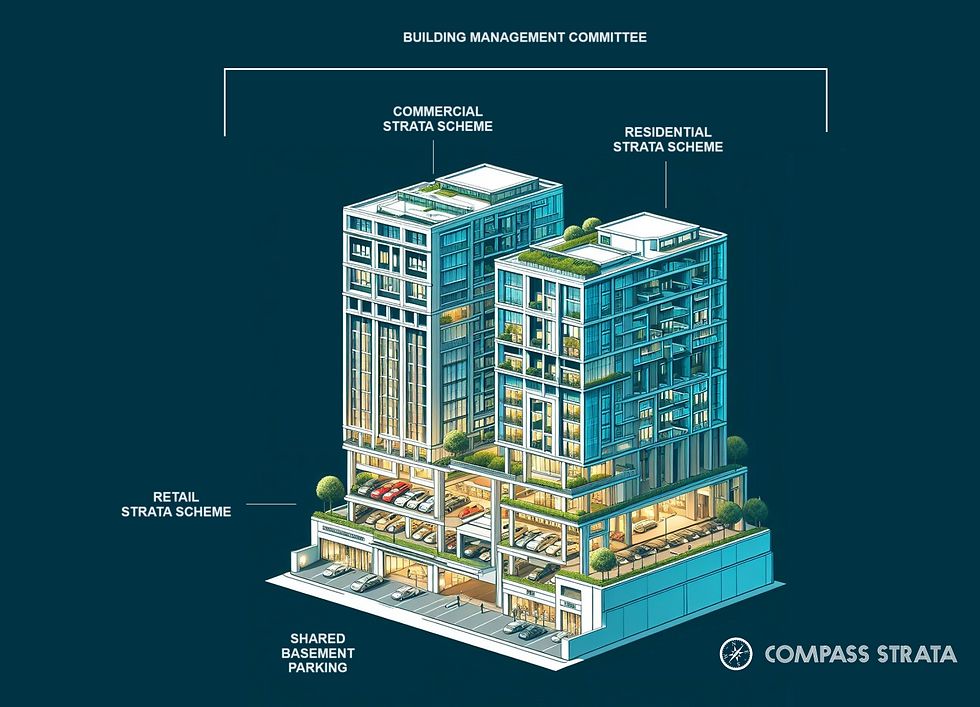Unravelling the Role of Building Management Committees (BMCs)
- Compass Strata

- Jan 31, 2024
- 3 min read
Updated: Mar 25, 2024

A Building Management Committee (BMC) is a specialised entity established within mixed-use developments, particularly in strata schemes with a diverse range of property uses (residential, commercial, retail, etc.) within the same building or development. Unlike traditional strata committees, a BMC committee, made from representatives from the strata plans that make up the development, is created to address the unique challenges posed by mixed-use developments.
The Basics of BMCs
Formation: The legal foundation for BMCs is outlined in the Strata Schemes Development Act 2015. The Strata Management Statement (SMS), a registered document, governs the operations of the BMC and is binding on the owners within the scheme, it outlines the management structure, functions, and decision-making processes specific to shared facilities and services. Examples of shared facilities can include shared loading dock, parking, gardens, swimming pool, gym, clubhouses, and function space. Shared services may include waste management, security, elevators, fire safety, HVAC, utilities infrastructure like water, electricity and gas.
Purpose: The primary purpose of a BMC is to compartmentalise operational decisions within different usage areas of the building. This segregation ensures that the governance of the entire building focuses on issues that impact all occupants and owners collectively. If the residential, commercial, and retail occupants have differing goals (e.g. maximising revenue for commercial spaces, ensuring a peaceful living environment for residents), the BMC structures decision-making to accommodate these diverse interests.
Decision-Making: The BMC is responsible for making decisions related to shared facilities, services, and other matters that affect multiple components of the mixed-use scheme such as architectural code.
Cost Allocation: BMCs address fair and accurate cost allocation for shared expenses, such as insurance, water, and maintenance, considering the varying needs of different usage types within the building. For example, if a building has a shared rooftop garden, the BMC ensures that the costs associated with its maintenance are distributed fairly among residential, commercial, and retail owners based on factors including access and likely usage. Such cost allocations are set out in the Shared Facilities Schedule in the Strata Management Statement (SMS), identifying and allocating the shared costs amongst members. The schedule is typically prepared by a Quantity Surveyor and any alterations to the schedule will most likely require the engagement of one.

Using the development depicted in the image above, each of the commercial, residential and retail strata schemes has its own Owners Corporation that makes decisions about their own respective strata schemes. The Building Management Committee (BMC), made up of representatives from each individual scheme, sits on top of all the strata schemes like an umbrella. Decisions concerning shared infrastructure, facilites, services for the development, such as shared basement parking, are made by the BMC, guided by the Strata Management Statement (SMS).
Common BMC Challenges
Like any community, BMCs encounter a spectrum of challenges that can impact their smooth functioning. Let's delve into some of the more common ones.
Diverse Stakeholder Interests: One of the primary challenges faced by BMCs is managing the diverse interests of property owners with distinct objectives. From residential comfort to maximising commercial revenue, finding a harmonious balance requires effective communication and consensus-building.
Complex Decision-Making: BMCs often grapple with intricate decisions concerning shared facilities, maintenance priorities, and financial allocations. Effective decision-making hinges on transparent communication and collaborative efforts to ensure the well-being of the overall community.
Communication Breakdowns: BMC representatives must report back, get support and sought approval from their respective strata committee or decision-making bodies. They are acting on behalf of the entire Owners Corporation and decisions made at the BMC level impacts individual owners.
Disputes Over Shared Spaces: Disputes over shared spaces, such as lobbies or recreational facilities, can strain relationships within the community. BMCs must navigate these issues diplomatically, focusing on equitable solutions for all stakeholders.
Effectively addressing these challenges demands a proactive stance, clear communication, and a dedication to discovering practical solutions. Compass Strata excels in guiding BMC committees through intricacies, ensuring efficient governance, and promoting collaboration among diverse stakeholders. Uncover new possibilities with Compass Strata and enhance your BMC's path to success.




